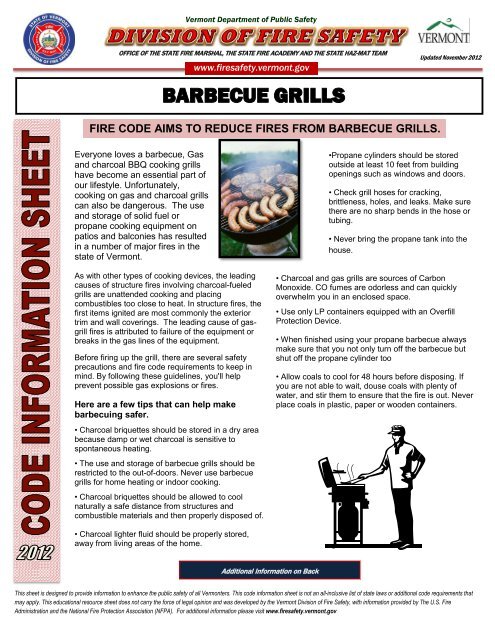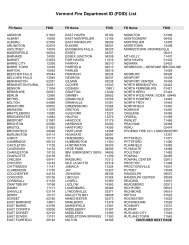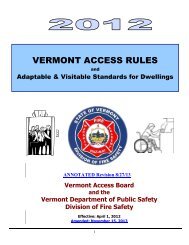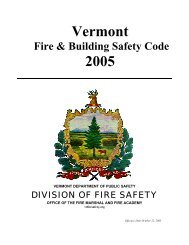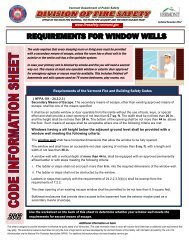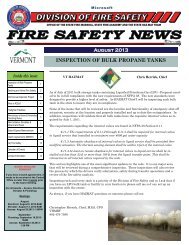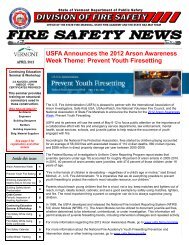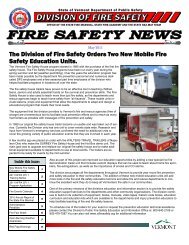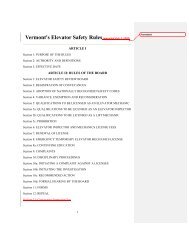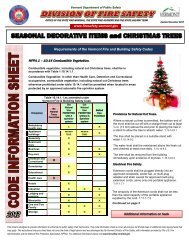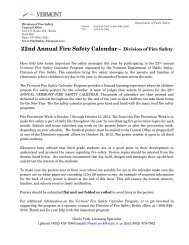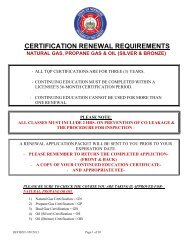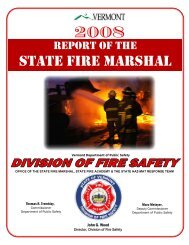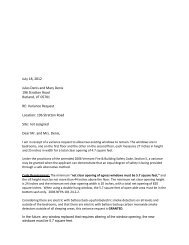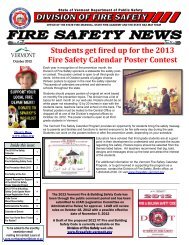fire code aims to reduce fires from barbecue grills. - Vermont ...
fire code aims to reduce fires from barbecue grills. - Vermont ...
fire code aims to reduce fires from barbecue grills. - Vermont ...
Create successful ePaper yourself
Turn your PDF publications into a flip-book with our unique Google optimized e-Paper software.
<strong>Vermont</strong> Department of Public Safety<br />
OFFICE OF THE STATE FIRE MARSHAL, THE STATE FIRE ACADEMY AND THE STATE HAZ-MAT TEAM<br />
www.<strong>fire</strong>safety.vermont.gov<br />
Updated November 2012<br />
FIRE CODE AIMS TO REDUCE FIRES FROM BARBECUE GRILLS.<br />
Everyone loves a <strong>barbecue</strong>, Gas<br />
and charcoal BBQ cooking <strong>grills</strong><br />
have become an essential part of<br />
our lifestyle. Unfortunately,<br />
cooking on gas and charcoal <strong>grills</strong><br />
can also be dangerous. The use<br />
and s<strong>to</strong>rage of solid fuel or<br />
propane cooking equipment on<br />
patios and balconies has resulted<br />
in a number of major <strong>fire</strong>s in the<br />
state of <strong>Vermont</strong>.<br />
As with other types of cooking devices, the leading<br />
causes of structure <strong>fire</strong>s involving charcoal-fueled<br />
<strong>grills</strong> are unattended cooking and placing<br />
combustibles <strong>to</strong>o close <strong>to</strong> heat. In structure <strong>fire</strong>s, the<br />
first items ignited are most commonly the exterior<br />
trim and wall coverings. The leading cause of gasgrill<br />
<strong>fire</strong>s is attributed <strong>to</strong> failure of the equipment or<br />
breaks in the gas lines of the equipment.<br />
Before firing up the grill, there are several safety<br />
precautions and <strong>fire</strong> <strong>code</strong> requirements <strong>to</strong> keep in<br />
mind. By following these guidelines, you'll help<br />
prevent possible gas explosions or <strong>fire</strong>s.<br />
Here are a few tips that can help make<br />
barbecuing safer.<br />
• Charcoal briquettes should be s<strong>to</strong>red in a dry area<br />
because damp or wet charcoal is sensitive <strong>to</strong><br />
spontaneous heating.<br />
• The use and s<strong>to</strong>rage of <strong>barbecue</strong> <strong>grills</strong> should be<br />
restricted <strong>to</strong> the out-of-doors. Never use <strong>barbecue</strong><br />
<strong>grills</strong> for home heating or indoor cooking.<br />
• Charcoal briquettes should be allowed <strong>to</strong> cool<br />
naturally a safe distance <strong>from</strong> structures and<br />
combustible materials and then properly disposed of.<br />
•Propane cylinders should be s<strong>to</strong>red<br />
outside at least 10 feet <strong>from</strong> building<br />
openings such as windows and doors.<br />
• Check grill hoses for cracking,<br />
brittleness, holes, and leaks. Make sure<br />
there are no sharp bends in the hose or<br />
tubing.<br />
• Never bring the propane tank in<strong>to</strong> the<br />
house.<br />
• Charcoal and gas <strong>grills</strong> are sources of Carbon<br />
Monoxide. CO fumes are odorless and can quickly<br />
overwhelm you in an enclosed space.<br />
• Use only LP containers equipped with an Overfill<br />
Protection Device.<br />
• When finished using your propane <strong>barbecue</strong> always<br />
make sure that you not only turn off the <strong>barbecue</strong> but<br />
shut off the propane cylinder <strong>to</strong>o<br />
• Allow coals <strong>to</strong> cool for 48 hours before disposing. If<br />
you are not able <strong>to</strong> wait, douse coals with plenty of<br />
water, and stir them <strong>to</strong> ensure that the <strong>fire</strong> is out. Never<br />
place coals in plastic, paper or wooden containers.<br />
• Charcoal lighter fluid should be properly s<strong>to</strong>red,<br />
away <strong>from</strong> living areas of the home.<br />
Additional Information on Back<br />
This sheet is designed <strong>to</strong> provide information <strong>to</strong> enhance the public safety of all <strong>Vermont</strong>ers. This <strong>code</strong> information sheet is not an all-inclusive list of state laws or additional <strong>code</strong> requirements that<br />
may apply. This educational resource sheet does not carry the force of legal opinion and was developed by the <strong>Vermont</strong> Division of Fire Safety, with information provided by The U.S. Fire<br />
Administration and the National Fire Protection Association (NFPA). For additional information please visit www.<strong>fire</strong>safety.vermont.gov
DFS CODE INFORMATION SHEET<br />
Residential Single Station Smoke Alarms<br />
The <strong>fire</strong> and building safety <strong>code</strong> includes regulations concerning <strong>grills</strong> on and near combustible<br />
decks and structures.<br />
Requirements of the<br />
<strong>Vermont</strong> Fire and Building Safety Code<br />
For other than one- and two-family dwellings, no hibachi, gas-<strong>fire</strong>d grill, charcoal grill, or other<br />
similar devices used for cooking, heating, or any other purpose, shall be used or kindled on any<br />
balcony or under any overhanging portion or within 10 ft (3 m) of any structure. Listed electric<br />
ranges, <strong>grills</strong>, or similar electrical apparatus shall be permitted.<br />
[ NFPA 1 : Sec10.11.6.1]<br />
Open <strong>fire</strong>s and cooking <strong>fire</strong>s shall be constantly attended by a competent person until such <strong>fire</strong><br />
is extinguished. This person shall have a garden hose connected <strong>to</strong> the water supply or other<br />
<strong>fire</strong>-extinguishing equipment readily available for use.<br />
[ NFPA 1 : Sec10.11.5]


